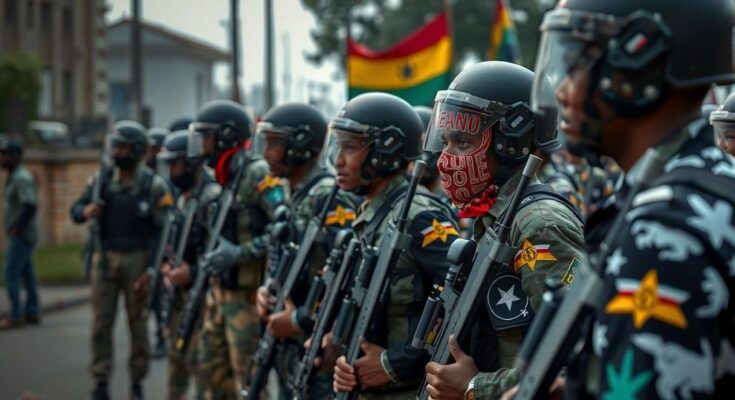Human Rights Watch has accused Kenyan security forces of abducting, torturing, and killing individuals tied to anti-government protests between June and August 2023. Victims’ stories, like that of Mary Mwangi, emphasize the urgency of accountability as numerous fatalities underscore the ongoing struggle for human rights amidst state-sanctioned violence. Despite government denials of involvement, calls for justice continue in a society fraught with tension and despair.
In a chilling exposé of unrest in Kenya, Human Rights Watch has leveled grave accusations against the country’s security forces, claiming that they participated in the abduction, torture, and killing of individuals perceived as leaders of anti-government protests during the turbulent summer of 2023. Shocking accounts detail how abductees were allegedly held in clandestine facilities—forest hideouts and crumbling buildings—deprived of family contact and legal representation, painting a harrowing picture of state-sanctioned violence against dissenters. The heart-wrenching tale of Mary Muthoni Mwangi resonates deeply in this narrative. She lost her son, 20-year-old Kennedy Njeru, during a protest against a crippling tax hike. In a sorrowful search that stretched for four agonizing days, she ultimately discovered her son’s lifeless body in a city mortuary, marked by the telltale sign of a bullet wound to his head. This devastating revelation adds to the mounting toll, with human rights organizations reporting 61 fatalities in the wake of the protests. Mausi Segun, the head of HRW’s Africa division, asserts that police involvement was pervasive, stating, “Whoever the initial abductors were, the police were involved because people were taken to police stations and many times the torture happened while people were in police custody.” Testimonies from over 75 individuals, including victims and police officers, paint a grim picture of targeted persecution, with plainclothes officers allegedly hunting down protesters, rendering them untraceable to anxious families and rights advocates. As the investigation deepens, the stories reveal a sinister twist—many victims’ bodies, disfigured and discarded, have been discovered in unmarked locations, often bearing the marks of torture. Segun revealed, “Many of those bodies have shown signs of torture and dismemberment of body parts, showing what they went through at the hands of their captors.” Despite these harrowing allegations, Kenyan security forces maintain their innocence, with President William Ruto dismissing claims of abductions and urging families to report incidents directly to the government. However, amid rising fears and demands for accountability, on September 24, Mwangi joined a group of activists seeking answers from Ruto, only to be met with teargas and resistance. With tension and despair hanging thick in the air, the conflict between the government and its citizens embodies a struggle for justice in the face of oppression.
The unrest in Kenya during mid-2023 was fueled by public outrage over proposed tax increases, which catalyzed widespread protests throughout the country. Human Rights Watch has reported on the violent crackdown by security forces, highlighting a pattern of abuses against demonstrators, from abductions to extrajudicial killings. The alarming rise in violent encounters between civilians and police illustrates a dangerous deterioration of civil rights in the nation, challenging the capacity of the government to protect and respect its citizens’ fundamental rights and freedoms. The ongoing efforts to address these grievances reflect a broader struggle for justice and accountability in a society grappling with deep-seated systemic issues.
The accusations against Kenyan security forces reveal a sorrowful and alarming truth about state-sponsored violence against its own citizens. The loss of life in the fight against oppressive policies reflects a broader struggle for human rights and the need for accountability. As families like Mary Mwangi’s seek justice for their loved ones, the world watches to see how the Kenyan government will respond to these serious allegations of abuse and whether it will prioritize the protection of its citizens over suppression of dissent.
Original Source: www.voanews.com



